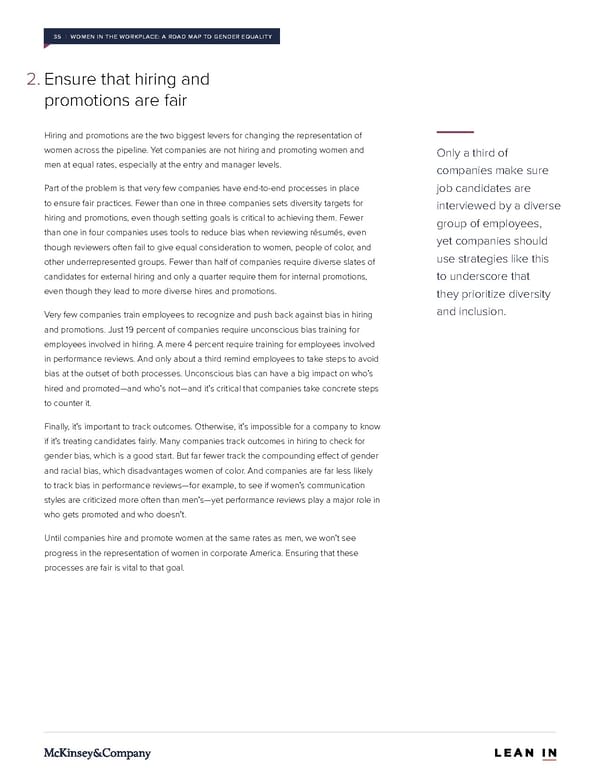35 | WOMEN IN THE WORKPLACE: A ROAD MAP TO GENDER EQUALITY 2. Ensure that hiring and promotions are fair Hiring and promotions are the two biggest levers for changing the representation of women across the pipeline. Yet companies are not hiring and promoting women and Only a third of men at equal rates, especially at the entry and manager levels. companies make sure Part of the problem is that very few companies have end-to-end processes in place job candidates are to ensure fair practices. Fewer than one in three companies sets diversity targets for interviewed by a diverse hiring and promotions, even though setting goals is critical to achieving them. Fewer group of employees, than one in four companies uses tools to reduce bias when reviewing résumés, even yet companies should though reviewers often fail to give equal consideration to women, people of color, and other underrepresented groups. Fewer than half of companies require diverse slates of use strategies like this candidates for external hiring and only a quarter require them for internal promotions, to underscore that even though they lead to more diverse hires and promotions. they prioritize diversity Very few companies train employees to recognize and push back against bias in hiring and inclusion. and promotions. Just 19 percent of companies require unconscious bias training for employees involved in hiring. A mere 4 percent require training for employees involved in performance reviews. And only about a third remind employees to take steps to avoid bias at the outset of both processes. Unconscious bias can have a big impact on who’s hired and promoted—and who’s not—and it’s critical that companies take concrete steps to counter it. Finally, it’s important to track outcomes. Otherwise, it’s impossible for a company to know if it’s treating candidates fairly. Many companies track outcomes in hiring to check for gender bias, which is a good start. But far fewer track the compounding effect of gender and racial bias, which disadvantages women of color. And companies are far less likely to track bias in performance reviews—for example, to see if women’s communication styles are criticized more often than men’s—yet performance reviews play a major role in who gets promoted and who doesn’t. Until companies hire and promote women at the same rates as men, we won’t see progress in the representation of women in corporate America. Ensuring that these processes are fair is vital to that goal.
 Women in the Workplace Page 41 Page 43
Women in the Workplace Page 41 Page 43